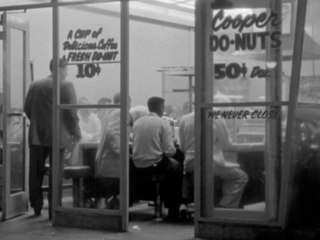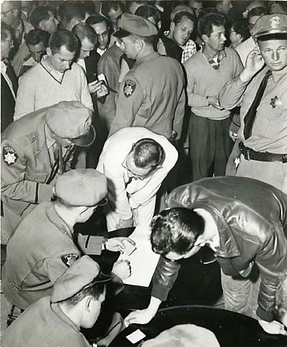
The White Night riots were a series of violent events sparked by an announcement of a lenient sentencing of Dan White for the assassinations of George Moscone, the mayor of San Francisco, and of Harvey Milk, a member of the city's Board of Supervisors who was one of the first openly gay elected officials in the United States. The events took place on the night of May 21, 1979, in San Francisco. Earlier that day White had been convicted of voluntary manslaughter, the lightest possible conviction for his actions. The lesser conviction outraged the city's gay community, setting off the most violent reaction by gay Americans since the 1969 Stonewall riots in New York City.

The Stonewall Inn is a gay bar and recreational tavern at 53 Christopher Street in the Greenwich Village neighborhood of Manhattan in New York City. It was the site of the 1969 Stonewall riots, which led to the gay liberation movement and the modern fight for LGBT rights in the United States. When the riots occurred, Stonewall was one of the relatively few gay bars in New York City. The original gay bar occupied two structures at 51–53 Christopher Street, which were built as horse stables in the 1840s.
Operation Soap was a raid by the Metropolitan Toronto Police against four gay bathhouses in Toronto, Ontario, Canada, which took place on February 5, 1981. Nearly three hundred men were arrested, the largest mass arrest in Canada since the 1970 October crisis, before the record was broken during the 2006 Stanley Cup Playoffs in Edmonton, Alberta.
This is a list of notable events in the history of LGBT rights that took place worldwide in the 1950s.

The Black Cat Tavern is an LGBT historic site located in the Silver Lake neighborhood of Los Angeles, California. In 1967, it was the site of one of the first demonstrations in the United States protesting police brutality against LGBT people, preceding the Stonewall riots by over two years.
Queer Liberaction (QL) is a Dallas–Fort Worth, Texas-based grassroots organization advocating for lesbian, gay, bisexual, and transgender (LGBT) rights. The group was founded in November 2008 following the international attention surrounding California's Proposition 8, which changed that state's Constitution to deny marriage rights to any LGBT couples who are not defined as "a man and a woman", passed by a slight majority. The organization is a proponent of same-sex marriage rights for LGBT couples, considering civil unions and domestic partnerships as less than full equality.
The Rainbow Lounge raid occurred in the early morning hours of June 28, 2009, at the Rainbow Lounge, a newly opened gay bar in Fort Worth, Texas. The raid was carried out by members of the Texas Alcoholic Beverage Commission (TABC) and the Fort Worth Police Department. Several customers were arrested for public intoxication and one customer, Chad Gibson, received a severe head and brain injury while in custody. The police also claimed the customers made sexual advances and contact with them. Other customers were detained and later released without arrest.
The Patch was an LGBT bar formerly located at 610 W. Pacific Coast Highway in the Los Angeles neighborhood of Wilmington, California. The Patch, along with the Black Cat Tavern, played a pivotal role in the gay rights movement, when, in August 1968, it was one of the first sites where there was open resistance to the constant police harassment of gay establishments and meeting places in Southern California.
Mary's, originally called Mary's, Naturally and sometimes referred to as Mary's Lounge, was an iconic gay bar located in the Montrose neighborhood in Houston, Texas, in the United States. The bar opened in 1968, and by the time of its permanent closing in November 2009, it was the oldest gay bar in Houston and one of the oldest in Texas. In addition to being one of the most popular and well-known gay bars in Montrose, Mary's was a hub for gay political activism. In 2011, OutSmart said that the bar "anchored" Houston's gay community in Montrose during its nearly forty-year history.
Throughout Dallas–Fort Worth, there is a large lesbian, gay, bisexual, and transgender community. Since 2005, DFW has constituted one of the largest LGBT communities in Texas.

The Cooper Do-nuts Riot was an alleged uprising in reaction to police harassment of LGBT people at a 24-hour donut cafe in Los Angeles in 1959. Whether the riot actually happened, the date, location and whether or not the cafe was a branch of the Cooper chain are all disputed, and there is a lack of contemporary documentary evidence, with the Los Angeles Police Department (LAPD) stating that any records of such event would have been purged years ago.
Just Marion & Lynn's, stylized "Just" Marion & Lynn's, was a gay bar that was opened in 1973 by Marion Pantzer and Lynn Hornaday in the Montrose neighborhood of Houston, Texas, United States. It was one of the first lesbian-oriented bars to open in Houston. The bar closed in 1987, one year after Pantzer was murdered.
Maud's was a lesbian bar at 937 Cole Street in San Francisco's Cole Valley neighborhood which opened in 1966 and closed in 1989. At the time of its closing, which was captured in the film, Last Call at Maud's, it was claimed to be the oldest lesbian bar in the United States. Its history, documented in the film and other media, spanned almost a quarter-century of LGBTQ events.
Diego Viñales was a former Argentinian student who was swept up in a police raid on the Snake Pit gay bar in New York's Greenwich Village in March 1970. The raid at the Stonewall Inn that had sparked rioting and gay activism had occurred the previous summer, but such raids were still common. Taken to the police station, Viñales, who was on an expired student visa and fearful of deportation, attempted to escape by jumping out a second-floor window. He landed on a spiked fence. Viñales suffered grave injuries but survived and was arrested. Protest marches in response to the day's events were led by gay activist groups formed in the wake of Stonewall and helped spark greater community awareness and interest in the upcoming Christopher Street Liberation Day events scheduled for 28 June to commemorate the first anniversary of the Stonewall riots.
Tommy's Place and 12 Adler Place were two interconnected lesbian bars in the North Beach district of San Francisco. Together, they created the first business in San Francisco that was owned and managed by out lesbians, beginning in the late 1940s. Tommy's Place/12 Adler Place was the site of an infamous 1954 police raid, during the era of the Lavender Scare. The raid was heavily covered by local media and ultimately contributed to the bar's 1955 closure.

The Cock is a gay dive bar in the East Village neighborhood of Manhattan in New York City. It is noted for its exhibitionist atmosphere and popularity as a cruising destination. Opened in 1998, the venue has been described by them. magazine as "a rarified taste of old New York and the cruisy gay scene that existed [there] in the '80s and '90s". In the late 1990s and early 2000s, it experienced frequent police raids under Mayor Rudy Giuliani's anti-nightlife crackdowns. The Cock has relocated twice, and its 2015 move along Second Avenue was met with opposition by nearby residents and Manhattan Community Board 3. Two other attempted moves, in 2014 and 2021, were blocked by the community board. Critics characterize the bar as "filthy", "seductive", and "alluring", noting that it is an unusual find in the United States and bears resemblance to European red-light district establishments.
The Atlanta Eagle police raid was a police raid targeting the Atlanta Eagle, a gay bar in Atlanta, Georgia, United States. The raid occurred on September 10, 2009, due to anonymous tips alleging that illegal drug use and sex was occurring at the bar. Several dozen officers were involved in the raid, including members of the Atlanta Police Department's vice squad and the "Red Dog Unit", a SWAT-like unit typically used in high drug use areas. None of the 62 bar patrons that night were arrested, although eight employees were. Seven of these employees were either found not guilty or had charges dropped against them, while one was not present at the trials and had a bench warrant issued against him.
The Fun Lounge police raid was a 1964 police raid that targeted Louie's Fun Lounge, a gay bar near Chicago, Illinois, United States. The raid led to the arrest of over 100 individuals and is considered a notable moment in the LGBT history of the area.

The Hazel's Inn raid was a police raid on a gay bar in Pacifica, California on February 19, 1956. Thirty-five officers from the San Mateo County Sheriff's Department raided the bar, arresting 77 gay men and 10 lesbians, for "operating a dance without a permit" and serving alcohol to minors. The American Civil Liberties Union's involvement in the patrons' defense represented one of the organization's first ever LGBT legal rights cases.
The Gay Coalition of Denver (1972-1977) was a gay liberation organization founded in Denver, Colorado. GCD was central for the gay community, and offered services like doctor referrals, counseling, and a phone hotline. They led the City Council Revolt in October 1973, in which the Denver City Council repealed Denver laws that targeted the gay community.





